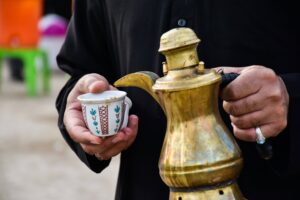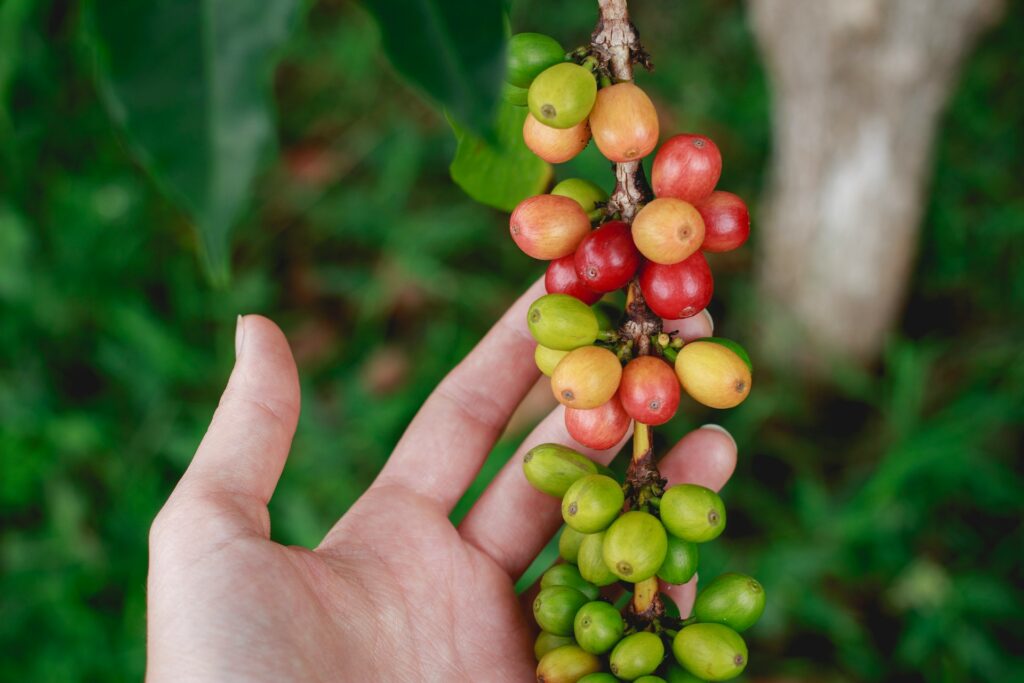Coffee has a long history, starting in Ethiopia and spreading to places like the United States. People have enjoyed it for thousands of years, not just as a drink. It's been part of important events like the Boston Tea Party and even blessed by religious leaders like the Pope.
Let's learn more about how this ancient drink began.
In this article we'll cover:
- The Origin of Coffee
- Coffee Makes a Pilgrimage
- The Expansion of Coffee Cultivation
- Coffee Moves to the Americas
- Direct Trade: The Future of Coffee
- Ethical and Environmental Responsibility
- Final Thoughts
- Frequently Ask Questions
The Origin of Coffee

Several stories tell of coffee's beginnings, but the most famous involves an Ethiopian goat herder named Kaldi. Around 700-800 AD, he noticed his goats had extra energy after eating red berries from a plant. When he tried the fruit, he felt the same boost. He shared the berries with monks at a nearby monastery, who also felt more energized and focused.
However, people probably didn't start roasting coffee beans for drinks until the 13th century, long after Kaldi's time. Back then, they likely ate the fruit, sometimes mixed with animal fat for a handy snack.
Coffee Makes a Pilgrimage
 Coffee made its way to Yemen through the port of Mocha. It became very popular in Arabia, where Muslims used it to stay awake during long nights of prayer. Since alcohol is not allowed, it got the nickname “Wine of Araby.”
Coffee made its way to Yemen through the port of Mocha. It became very popular in Arabia, where Muslims used it to stay awake during long nights of prayer. Since alcohol is not allowed, it got the nickname “Wine of Araby.”
Foreigners tasted coffee when they visited Mecca on pilgrimages and enjoyed it in coffee houses. However, the governor of Mecca banned it because he was worried about its stimulating effect. After many protests and a decree from the Sultan, the ban was lifted.
The Expansion of Coffee
Until the 17th century, coffee mostly grew in Arabia and Africa. Then, an Indian named Baba Budan brought beans to India, starting coffee growing there. In 1616, the Dutch made the first European-owned coffee farm in Sri Lanka, later expanding to Java, Indonesia.
Coffee reached Venice in 1570, but was seen as bad because of its bitter taste and strong effects. Pope Clement VIII tried it and said it was okay for Christians to drink, even baptizing it. Coffee became popular in Italy and France, and the first British coffee house opened in 1652, becoming places for talks and debates.
Coffee Moves to the Americas
In the 18th century, coffee came to the Americas. Spanish grew it in Central America and French in the Caribbean. Brazilian Lieutenant Colonel Palheta got coffee plants from the French and grew them in Brazil, making it a big coffee producer today.
The United States is the top coffee importer. After the Boston Tea Party in 1773, Americans switched to coffee. It became more popular, leading to new ways to brew it and new entrepreneurs spreading it across the country.
Direct Trade: The Future of Coffee
In the 1960s, people began to prefer specialty coffee, leading to Starbucks opening in 1971. This sparked the “third wave” of coffee, focusing on quality, direct trade, and sustainability.
Responsibly sourced coffee is getting more popular, focusing on fair treatment for farmers and workers, environmental sustainability, and quality. Coffee lovers can help by composting grounds, using low-waste brewing methods, and being mindful consumers.
While direct trade coffee is growing, it's still a small part of the market. Civilized Coffee believes in doing better by building genuine relationships and supporting sustainable farming. We work with local farmers to ensure transparency, fair trade, and great-tasting coffee for you.
Ethical and Environmental Responsibility

Today, manufacturing coffee prioritizes ethical and environmental concerns. These encompass minimizing pollution, adopting renewable energy sources, and ethically sourcing premium beans.
Ensuring fair treatment of growers, roasters, and other workers stands as a crucial aspect for coffee companies committed to sustainability. Sustainable coffee goes beyond taste; it entails guaranteeing fair wages for all involved while crafting exquisite, flavorful brews.
Final Thoughts
Coffee has been around for a really long time. It started in Ethiopia and spread all over the world. People have been enjoying it for thousands of years. We learned how it was discovered by an Ethiopian goat herder named Kaldi, and how it traveled to different countries like Yemen, Europe, and the Americas.
Nowadays, coffee is a big deal. There are lots of coffee shops, and people care more about where their coffee comes from and how it's made. This led to a movement called “direct trade,” which is all about treating farmers fairly and protecting the environment.
In short, coffee isn't just a tasty drink – it's also a big part of history and culture. And by learning more about it, we can enjoy our daily cup of coffee even more!
For detailed information and helpful tips about coffee, check out the articles provided below.
- How Coffee Beans are Grown, Picked, and Processed
- What is Coarse Ground Coffee?
- What is Pour Over Coffee?
Frequently Ask Questions
Why is it important to treat coffee farmers fairly?
Treating coffee farmers fairly means paying them well, ensuring safe working conditions, and supporting sustainable farming practices. It also involves respecting their cultural traditions and fostering honest partnerships. Fair treatment benefits everyone by improving the quality of coffee and the livelihoods of farmers.
What is the significance of coffee in modern society?
In modern society, coffee remains a popular beverage enjoyed by people worldwide. It has become an integral part of many cultures and economies, with the coffee industry supporting millions of livelihoods globally.
How can I learn more about where my coffee comes from?
You can learn more about where your coffee comes from by researching the origin of the coffee beans, looking for certifications like Fair Trade or Direct Trade, and supporting coffee companies that prioritize transparency and sustainability.
How can I reduce the environmental impact of my coffee consumption?
You can reduce the environmental impact of your coffee consumption by choosing sustainably sourced coffee, using reusable coffee cups and filters, composting coffee grounds, and supporting coffee companies that prioritize environmental sustainability.
What role did coffee play in religious and social settings?
Coffee played a significant role in religious and social settings, with coffeehouses becoming centers of intellectual and social activity in Europe. In the Middle East, coffee was used to facilitate prayer and social gatherings.
